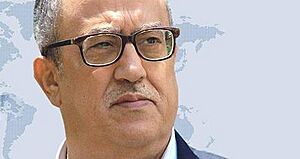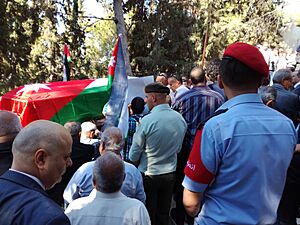Nahed Hattar facts for kids
Quick facts for kids
Nahed Hattar
|
|
|---|---|
| ناهض حتر | |
 |
|
| Born | 1960 Amman, Jordan
|
| Died | 25 September 2016 (aged 55–56) Amman, Jordan
|
| Cause of death | Assassination |
| Alma mater | University of Jordan |
| Occupation | Writer and political activist |
| Movement | Jordanian Social Left Movement |
Nahed Hattar (Arabic: ناهض حتر Nāhiḍ Ḥattar; 1960 – 25 September 2016) was a Jordanian writer and political activist. He was known for sharing his ideas about politics and society.
On September 25, 2016, he was killed outside a court building. He was there for a trial because he had shared a drawing that some people thought was disrespectful to religious beliefs.
Contents
Early Life
Nahed Hattar was born in 1960 in Amman, Jordan. He grew up in a Christian family. Later in his life, he identified as an atheist, meaning he did not believe in a god.
Political Ideas
Hattar was a leader in political groups that wanted to make society fairer and help ordinary people. He was part of groups like the National Progressive Current and the Jordanian Social Left Movement.
He often spoke out against economic policies in Jordan that he felt were unfair to many people. He also supported Arab Christians and their right to protect themselves from dangerous groups like Al-Nusra, Al-Qaeda, and the Islamic State of Iraq and the Levant. These groups are known for using violence.
Nahed Hattar was also a strong supporter of the Syrian President, Bashar al-Assad. He believed that Jordan should not become a new home for Palestinians and strongly supported the idea of Palestinian right of return, which means Palestinians should be able to return to their original homes.
His Death
On the morning of September 25, 2016, Nahed Hattar was shot and killed by a gunman. This happened near the Palace of Justice in Amman, the capital city of Jordan.
The person who shot him was arrested right away at the scene. This person was identified as Riad Ismaeel Abdullah, who was 49 years old and lived in east Amman. Abdullah was a preacher in a mosque and held extreme views. He was later charged in connection with Hattar's death.
See also
 | Claudette Colvin |
 | Myrlie Evers-Williams |
 | Alberta Odell Jones |


